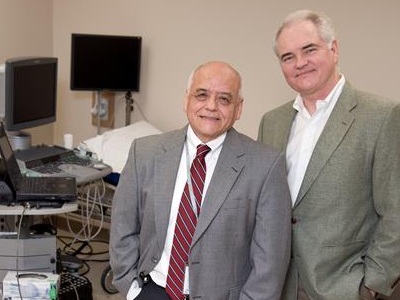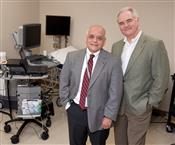November
- Mississippi Center for Clinical and Translational Research Home
- Contact MCCTR
- About Us
- Cores and Programs
- Funding Opportunities
- Training Opportunities
- News and Events
- News Archive
Jackson Heart Study dives into genetics of disease

Published in News Stories on November 17, 2016
A new study based on Jackson Heart Study data is the first to show that rare genetic variants may increase the risk of their associated diseases, regardless of family medical history.
University of Mississippi Medical Center faculty Dr. James Wilson, professor of physiology and biophysics, and Dr. Adolfo Correa, professor of medicine and director of the Jackson Heart Study, are co-authors on the paper published Nov. 9 in Science Translational Medicine.
Most of the study data came from 3,223 members of the Jackson Heart Study cohort. Started in 2000, the JHS is the largest longitudinal study of African-American cardiovascular health in the United States. It is a collaborative project between UMMC, Jackson State University and Tougaloo College.
“We have assessed a large number of traits in these same people, such as blood cholesterol, the heart's electrical activity, heart structure, extensive medical history and follow-up of medical events over time,” Correa said.
These comprehensive measurements allowed Harvard Medical School researchers to study the relationship between rare variants in 56 genes and 24 inheritable conditions. These conditions include certain cancers, high cholesterol and heart morphologies. The goal was to determine if people with these variants had higher rates of the conditions that these genes are expected to influence.
Genetic variants, or mutations, are differences in the DNA sequence. Some are benign, but others cause serious illnesses.
According to the paper, JHS cohort members with a rare variant were 4.7 times more likely to develop an associated condition during their lifetime. The researchers also studied European-Americans in the Framingham Heart Study, a Massachusetts-based study of cardiovascular disease risk factors. These people were six times more likely to develop an associated condition.
The findings suggest some benefit to the American College of Medical Genetics and Genomics' recommendation that clinical laboratories check for disease-causing variants in these 56 genes.
“Genetic screening has the potential to identify people who need particularly close screening for specific medical conditions, and perhaps can guide our treatment choices to allow each person to get the most effective treatment with the fewest side effects,” Wilson said.
“For example, if a patient has a variant associated with high cholesterol, their doctor should test their cholesterol levels, and if they are not in a healthy range they could begin treatment with medications,” Wilson said. In comparison, “People who have gene variants that are associated with cancer can have more frequent cancer screenings.”
“That said, much more information in many populations will be needed to make firm recommendations,” Wilson said. “For now, it would be premature to start looking for these genetic variants in everyone.”
The study is important because it demonstrates a seemingly obvious, but difficult to show relationship: people with genetic differences have health conditions more often than those who do not. Many studies rely on data from patient visits. Because the subjects already have signs of disease, this practice creates a biased sample. The prospective designs of the JHS and FHS avoid this pitfall.

Natarajan
“Data of this nature are not available from a typical health care system where only those who have come to medical attention get blood testing or certain types of diagnostic testing,” said Dr. Pradeep Natarajan, instructor of medicine at Harvard, one of the lead authors.
“[The Jackson and Framingham Heart Study] populations are uniquely suited for a study like this.”
The next step is to determine if knowing someone has a disease-associated variant improves patient outcomes. With this knowledge, can physicians tailor prevention and treatment efforts?
“We do not know if identifying individuals carrying these mutations will make a positive difference in their eventual clinical outcomes,” said Dr. Robert Green, associate professor of medicine at Harvard and senior study author.

Green
What the study does show, Green said, is that “…in the aggregate, mutations in a subset of genes are associated with a substantial risk of developing the related condition.”
The researchers used aggregate, not individual, risk because the variants are rare. For example, Wilson says less than one percent of people have a BRCA gene variant that raises the risk for breast and ovarian cancer. Only 10 JHS cohort members in this study had BRCA mutations. Only one had cancer.
“It is important to know that although variants in these genes are associated with an increased occurrence of the related traits, not everyone who has one of these variants will have a related medical trait or outcome,” Wilson said. “This study just one step along the road toward understanding human diseases.”
“These results help us to understand the genetic influences on important health conditions among African-Americans and the Jackson community in particular. They also provide new information on the potential role of genetic screening in general as part of health care,” Correa said.
The study is one of more than 70 published in 2016 using Jackson Heart Study data. It is the most productive year yet. Recent findings regarding kidney disease, diabetes, hypertension and mental health illustrate the extent of the JHS research portfolio.
This work was supported by the National Human Genome Research Institute, the Howard Hughes Medical Institute, the National Heart, Lung and Blood Institute and the National Institute on Minority Health and Health Disparities.
Photos
 | High Resolution Medium Resolution Low Resolution |


